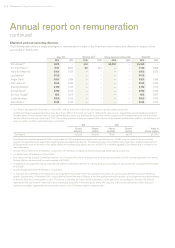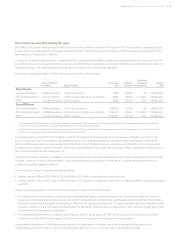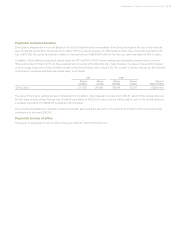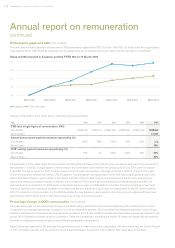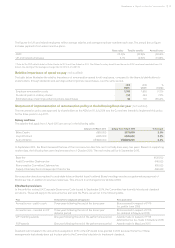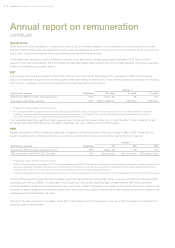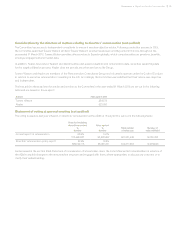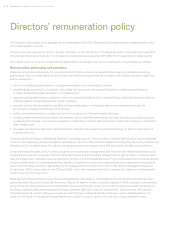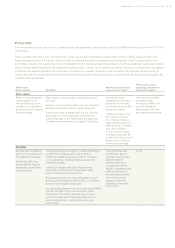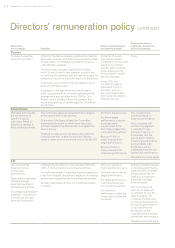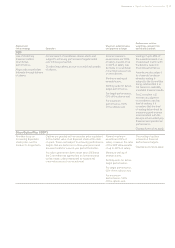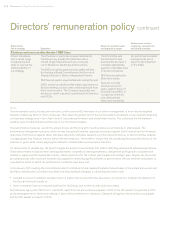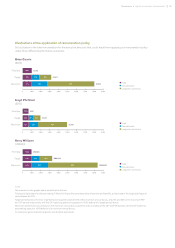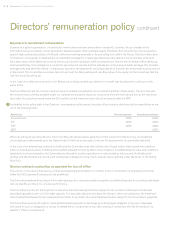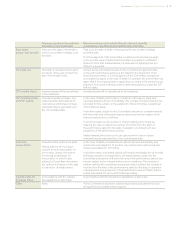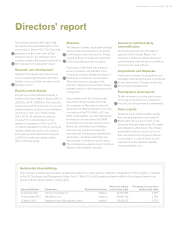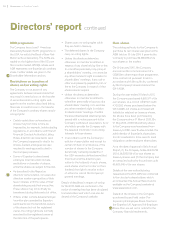Experian 2015 Annual Report Download - page 96
Download and view the complete annual report
Please find page 96 of the 2015 Experian annual report below. You can navigate through the pages in the report by either clicking on the pages listed below, or by using the keyword search tool below to find specific information within the annual report.
The Directors’ remuneration policy was approved by shareholders at the 2014 AGM and the Committee intends to implement this policy
for the three years to July 2017.
The policy has been adjusted for clarity to include information on the introduction of clawback provisions in line with the revised 2014
UK Corporate Governance Code. As it is not subject to shareholder approval at the 2015 AGM, it is included here for reference only.
The original version of the policy, as approved by shareholders, is available in the 2014 Annual Report on the Experian plc website.
Remuneration philosophy and principles
Experian’s remuneration philosophy for executive directors is that we should use reward to drive long-term, sustainable business
performance. The Committee therefore aims to have remuneration principles that are consistent with Experian’s business objectives
and are designed to:
• drive accountability and transparency, and align remuneration with shareholders’ interests;
• provide a balanced portfolio of incentives, which align both short-term (one-year) and longer-term (three-year) performance,
to deliver sustainable growth and value for our shareholders;
• apply demanding performance conditions to deliver sustained profitable growth across the Group, whilst setting these conditions
with due regard to actual and expected market conditions;
• pay base salaries that are market-competitive and appropriate, given an individual’s performance and experience and the
remuneration arrangements throughout the Group;
• deliver competitive benefits, to complement the other components of the remuneration package;
• provide competitive performance-related remuneration, which influences performance and helps to attract and retain executives,
by allowing them to earn commensurate rewards for outstanding and sustainable performance that leads to long-term shareholder
value creation; and
• strengthen the directors’ alignment with shareholders, through share ownership guidelines that apply to both executive and non-
executive directors.
These principles have always underpinned Experian’s remuneration policy. The Committee considers that the policy has stood the test
of time and is evidenced by Experian’s superior performance. The Committee remains confident that the policy will continue to serve the
interests of all of our stakeholders, through the strong performance and reward culture that we promote throughout our workforce.
In line with these principles, the Committee compares our remuneration arrangements with those of other relevant organisations and
companies of similar size and scope. The Committee also reviews our remuneration arrangements in light of market conditions, which
have once again been challenging and are expected to remain so for the foreseeable future. Performance-related incentives are targeted
at upper-quartile levels, for achieving stretching objectives. Long-term incentives are measured over a three-year performance period,
which the Committee considers is appropriate for the business and its strategic time horizons. Our shareholding guidelines are set
at high levels (300% of base salary for the CEO and 200% for the other executive directors) to maintain the alignment of interests with
shareholders over the longer term.
While the Committee’s primary focus is the executive directors’ remuneration, it also approves the remuneration structure for other
senior executives and works closely with the Human Resources team to ensure a consistent approach. When setting the remuneration
policy for the executive directors, the Committee takes into account the pay, employment conditions and remuneration trends across
the Group, especially when determining annual salary increases, although no specific remuneration ratios are used. Although the
Committee does not consult employees on executive directors’ pay or expressly include employees’ views in its deliberations, it is
mindful of the results of our periodic Global People Survey which focuses, in part, on remuneration, reward and performance.
94 Report on directors’ remuneration
Directors’ remuneration policy
•Governance


